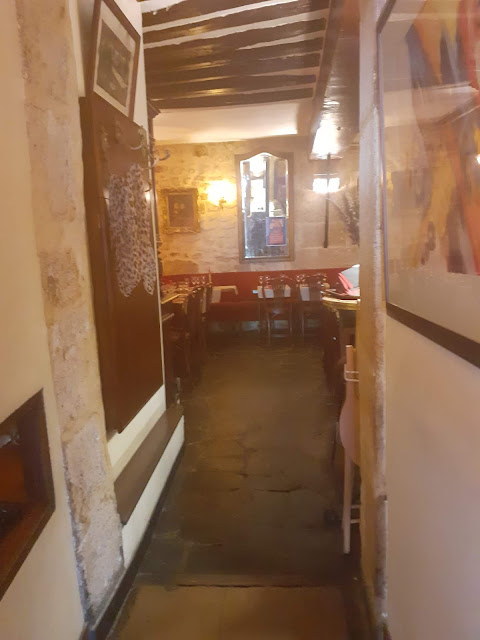I visited Paris a couple of weeks ago, and visited La Méthode. It's tucked away around a corner, so that it doesn't really look as if it is in the rue Descartes at all, but I suppose that was all part of the charm for Debord and Michèle. I was surprised at how old it was, how creaky and wooden beam-y it was, but maybe too that was part of the charm, that it had seen so much history, so much life. The books in English that have most information about the bar are Andrew Hussey's biography of Debord, The Game of War (2001) and Correspondence, 1957-60, being the first volume of Debord's letters. In the latter there are a couple of early mentions of Michèle opening a café, and how they were using the industrial painting of Pinot Gallizio, a fellow member of the Situationist International, to decorate the walls.
While I was sitting in La Méthode I thought idly about the industrial painting hanging from the wall, and it seemed such a million miles away from that hot Paris day, with the waitress asking me what I wanted to order, that I couldn't imagine it, but I'd really like to know if (a) there are any photos in anyone's archive of the few weeks that Debord and Michèle ran the bar and (b) if it was hung in the room pictured above, or the back room.
I never expected a back room, but I hadn't much idea before I went what it would be like. For the record, the back room is shown below, and maybe this was where the fabric was hung.
What can I say? The food was excellent, the waitress really helpful, it was cool on such a hot afternoon, and, frankly, it was the highlight of my holiday. I've long had thoughts of opening a café, but when I read that there had been a Situationist café, I thought it was just fab. And it's chronically undermentioned in the history of the SI.
"October 10th, Michèle is opening a kind of café called La Méthode on the rue Descartes," writes Debord, American grammar and all, to Pinot Gallizio, of the industrial fabric. Slightly later he writes again to Gallizio, "La Méthode opens Friday! Publicity attached" and the publicity is reproduced here
The flyer, of course, reminds us of the Lettrist flyer of 1953:
One of the great things about Debord's reaction to the opening and early weeks of La Méthode is his excitement. It was a period of intense activity for the SI, and was very much a part of this, very much propaganda by deed, the doing rather than the printed word. "In La Méthode," writes Andrew Hussey, "Guy Debord held court and presided over renegades from Moineau's and La Tonneau d'Or with a princely swagger, giving way to his love of talk and his notion of addiction to alcohol as a form of aesthetic practise which defied the bourgeois world." And that happiness continued : Debord tells Gallizio that the industrial painting "is perfectly integrated into the ambience of the place [and] it reinforces this ambiance in the warm sense that we wanted." Debord is often presented as the misery who is dissatisfied with everything, wants to tear everything down, and isn't afraid of ruins, but here he is talking happily about interior design. I love this side of him, the human, frail, sometimes wrong side to him, which we don't often see.
Within weeks it all went wrong. Andrew Hussey writes that there was "a dispute with the bar's previous owner, inept handling of the bar and cash register, and a row with the staff." In my life I have had to order alcohol for a bar (thankfully only being the messenger, not the one wondering how much wine we'd need) and I've had to handle cash and keep records. If I'd have worked there, I wouldn't have been a help, frankly, and I know the stress they might have felt. Everything went wrong, and it was all over. "The bar," writes Andrew, "was never referred to again."
I am assuming that the information about this comes from Michèle Bernstein, who Andrew interviewed for his biography. I'd love to ask her if they served food, as at Moineau's, and if they did, what it was like, and who cooked it. I'd love to know the day to day management, the sweeping up, the washing up, the wiping the tables.
There were a couple of tiny things which I noticed, which made me catch my breath when I was there. One of these was the floor, the old, tiled floor, which had been swept, and undoubtedly thrown up on, during those few weeks in October, so long ago.
The other was a couple of shelves, the sort you find in any café in the world, old shelves in a back corner, where things get put and no one notices.
There's nothing remarkable about these two things, except that they are a part, an everyday part of what it was. The un-noticed, everyday part. I'd love to know if Debord ever talked to Alice Becker Ho about La Méthode, or if it was just something that they passed, maybe during May 68, or another time, and he just remained silent. How much he ever thought about it, remembered it kindly or embarrassedly or something else. In her novel, The Night, published in 1961, Michèle makes Gilles and Carole - a version of Debord and his lover Michèle Mochot-Brehat - pause outside La Méthode, but without mentioning it, and in the English version this occurs on pages 25 to 26. She talks about the fountain, and the lions, and the area, but she doesn't mention the café. Because it wasn't ever mentioned again.
Andrew Hussey, The Game of War : The Life and Death of Guy Debord, Random House, 2001
Guy Debord, Correspondance, Vol 1, Semiotexte, 2009






Comments
Post a Comment